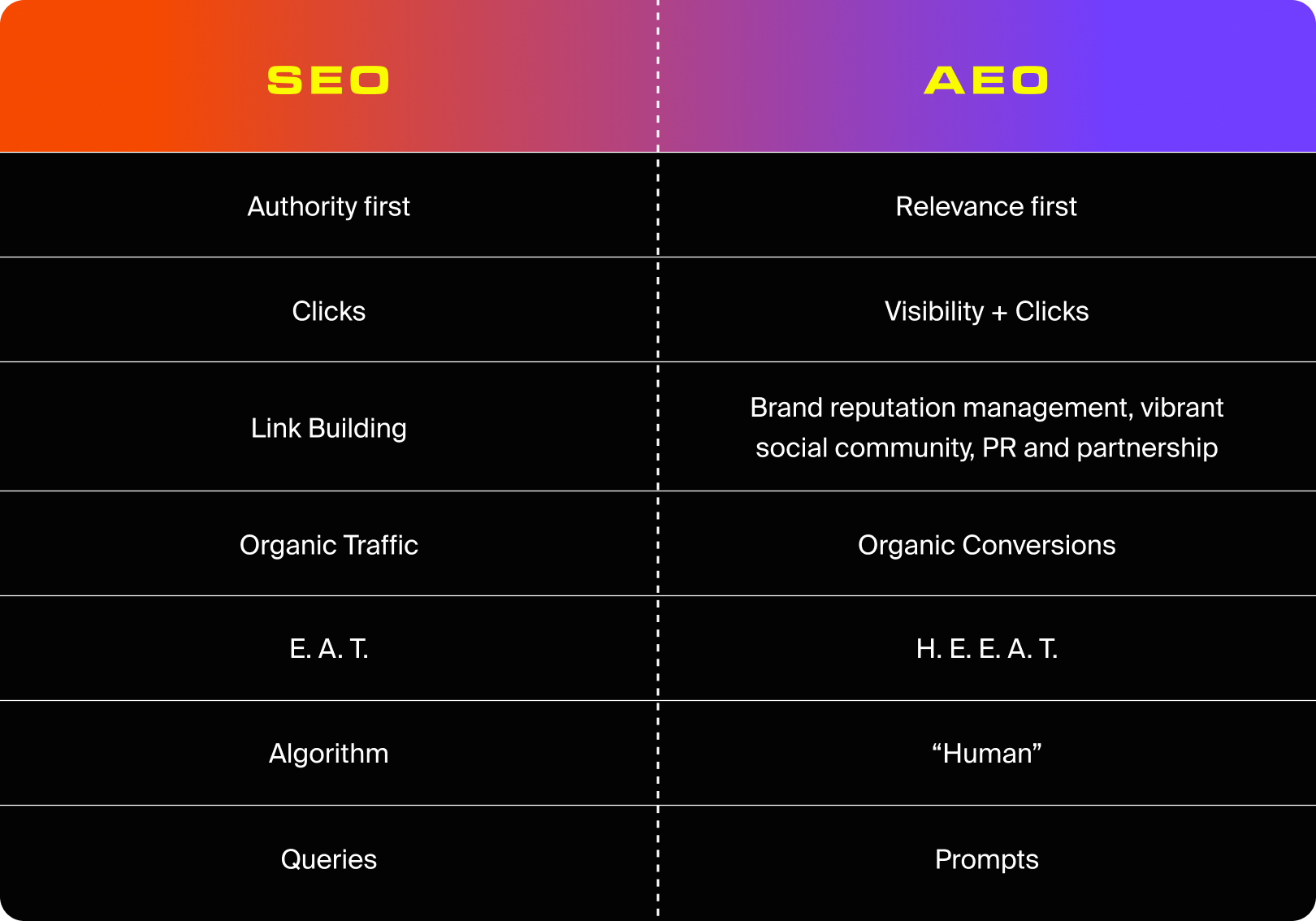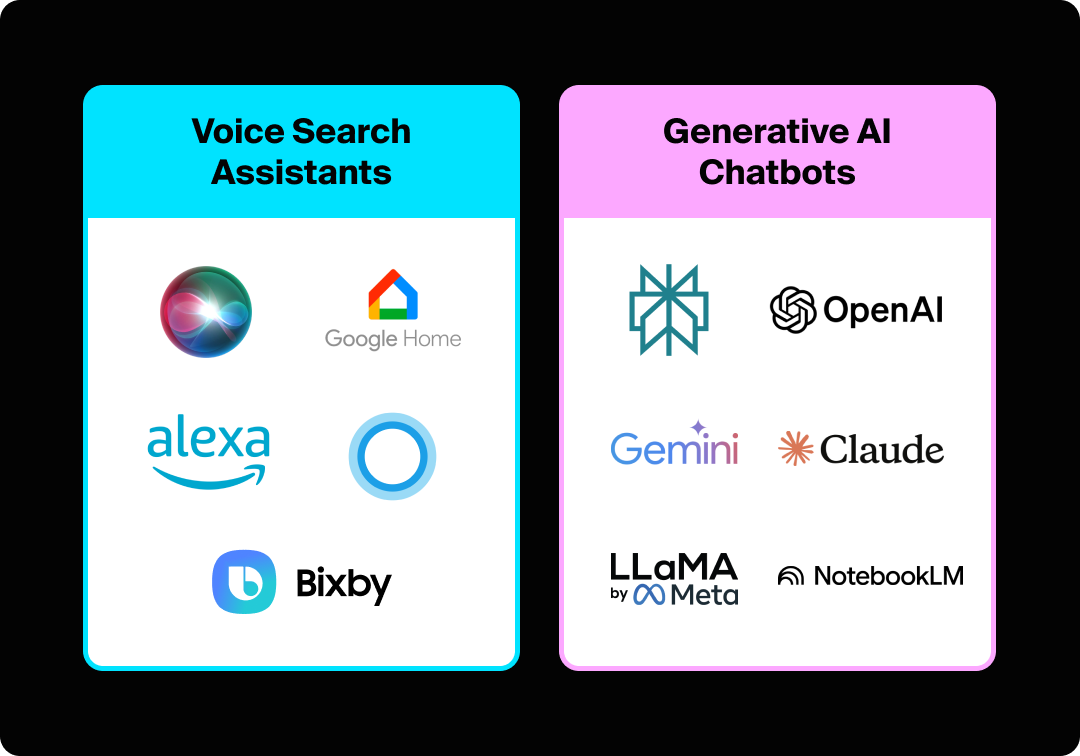If someone searches for your company on Google, what do you want them to see?
Achievements, award-winning products and services, and 5-star reviews are probably at the top of your list, right?
So, what do you do if there’s negative PR, scandalous news, negative reviews, or false information about your company circulating the internet?
This is where a strategic online reputation management system comes into play.
Using SEO and AEO strategies, you can optimize your website to showcase your company’s innovative ideas and work. These reputation management strategies will help you create content that outranks negative search results, pushing it lower on the search engine results page (SERP).
TL;DR How to Push Down Negative Search Results on Google
Step 1: Create a Blog and Optimize Website Pages. Establish authority for the keywords that return negative content and outrank them with positive content about your brand.
Step 2: Acquire High-Quality Backlinks. Backlinks boost your page rankings and help you outrank negative content.
Step 3: Create a Profile on Every Social Platform. Social media platforms have high domain authority. By creating a profile on each one, these accounts will rank high in search results automatically.
Step 4: Optimize for AI Overviews and Featured Snippets. These search results features appear above the first position on Google. Securing this spot ensures positive information will be the first thing users see.
Step 5: Contact Site Owner(s) and Request Removal of Information. If you would like the information completely removed from Google, simply contact the site owner and ask if they could remove it.
Step 6: Submit a Legal Request to Google to Remove the Information: If you contact the website owner and they do not comply, you can submit a legal request to Google to have the information taken down.
To learn more about how to implement these strategies, keep reading.
Why Online Reputation Management Is Important
Monitoring the way potential customers perceive your company online is important because any negative publicity can affect your sales and hurt your business long-term. Reputation management helps to ensure the information users see about your company in a Google search is factual, positive, and helpful. A positive reputation and online image will lead to growth and ensure the longevity of your business.
Need help managing your online reputation?
4 SEO Strategies to Push Down Negative Search Results
Search engine optimization (SEO) is a key tool in helping you manage your online reputation. Here are four SEO strategies to outrank negative content on Google.

1. Create a Blog and Optimize your Product and Landing Pages
If you don’t already have a blog for your business, it’s a great way to build authority and create online content that outranks negative content. Through your blog, you can create informational articles that target topics and common questions users may have about your industry. Blog posts help establish expertise in your niche, which increases your search rankings.
If you can start ranking with informative thought leadership pieces for primary keywords that contain negative search results, you can outrank them, thereby pushing them down in search results.
Best Practices for Building Out Your Website
- Create expert content in your niche that follows H-E-E-A-T principles.
- Optimize your product and landing pages with niche keywords.
- Add FAQ sections with Schema markup to product and landing pages.
- Improve page speed by enabling lazy loading, reducing the file size for images, and adding plugins to improve site performance.
2. Acquire High-Quality Backlinks
Backlinks from reputable sites help increase your domain authority. If you increase your domain authority, Google begins to recognize you as a trusted source, and your content will begin to rank better in search results.
How to Gain Backlinks From Authoritative Domains
- Conduct link-building outreach. You can reach out to other experts with high-authority sites within your niche and build relationships with them. After you’ve built rapport, you can offer a mutually beneficial link exchange to help build authority for both your website and theirs.
- Try guest blogging. You can also reach out to other authoritative websites to see if they would be interested in allowing you to create content for their website.
- Create content that features statistics from your industry or studies you have conducted; other domains will reference your studies and statistics to support their own blog posts.
- Respond to press releases with your expertise on the given topic. This establishes credibility to Google and provides your website with a backlink for the article your expertise will be featured in.
3. Establish Topical Authority
Pushing down negative search results is all about creating content that ranks higher. In order to do this, you must establish credibility to search engines, also known as topical authority. If Google recognizes you as an expert in a specific niche, your content will rank higher in searches with relevant keywords.
Websites with high topical authority in their niche usually rank in the top positions for search terms in their industry. For example, NerdWallet usually ranks on the first page for searches related to personal finance and credit cards. This is because NerdWallet has spent time creating blog posts that establish experience and credibility in these topics.
How to Establish Topical Authority
- Target keywords related to your company or niche that contain negative search results and create high-quality content that adheres to H-E-E-A-T principles.
- Include citations to other sources that have already established credibility in your niche.
- Create topic clusters with internal links. Linking to other blog posts you’ve written within the same topic creates an internal linking path search engines can follow. This shows Google that you’ve created many informative resources on your topic and further establishes your credibility.
4. Create a Social Media Profile and Content For Each Social Media Platform
Social networks like Instagram, TikTok, LinkedIn, and X are high-authority domains that rank high in Google search results. Establishing your company’s name with a social profile on these platforms will bring positive search results higher on the page when someone searches for your company.
Create videos and post content in your niche to increase online visibility and create an opportunity to be featured in rich results for queries related to your company or industry. When someone searches for your company, they’ll see informative social media content that reflects positive attributes and ideas from your brand.
4 AEO Strategies to Push Down Negative Search Results
Answer engine optimization is a great way to directly answer questions users have about your company and industry. Here are four AEO strategies to help push down negative search results.

1. Tailor Content To User Search Intent
Answer engine optimization is all about creating high-quality content that directly answers users’ questions. By tailoring your content to the specific questions the user may have, you greatly increase your chances of ranking in AI summaries and featured results.
Search engines, both traditional and AI-driven, want to provide the user with the most helpful answer as easily as possible, minimizing the users’ need to ask follow-up questions. Therefore, if you can answer the user’s query in a concise, highly informative way, your content will rank in search results.
How To Optimize Your Content for Search Intent
- Match the format of the answer already ranking for your target search query. For example, if the top-ranking answer is formatted as a bulleted list, make sure your answer is a list as well.
- Determine which of the four search intent types your target keyword falls under: informational, navigational, commercial, or transactional. Then make sure your blog content matches the intent of the primary keyword. Be sure to choose a primary keyword that has high search volume and low difficulty. For example, if your target keyword is informational, it would be a good idea to create a blog post. Conversely, if your keyword is commercial or transactional, you should create a highly optimized product page. For navigational keywords, you should create a landing page.
- Reference the People Also Ask section to find direct questions users are searching for, then target them with an informative answer under the header tag in your blog post or FAQ section. Answering users’ questions directly in your content improves search visibility.
2. Optimize For Voice Search
An estimated 30% of internet users around the world use voice search each week to find information, so it’s likely that users will be using it to find information about your company. The number of voice search users will continue to increase with the development of voice assistants and voice search technologies, so it’s important to optimize your content for voice-based searches.
How To Optimize For Voice Search
- Use conversational and natural language in your blog posts and product pages to match the language used in voice searches.
- Be clear and concise with your answers to help users find the answers to their questions as easily as possible. This is key for voice searches because users don’t want to spend a long time researching their questions. They want quick, informative answers.
- Add structured data to your pages to help search engines better understand the context of your content
- Since roughly 22% of voice searches are location-based, it’s important to optimize for local searches if applicable to your business. You should build out your Google Business profile so users can find your company and leave positive reviews. You can also create location-specific landing pages, like “New York Digital Marketing Agency,” and location-specific blog posts, like listicles that rank the leading companies in your city.
3. Optimize For AI Overviews
AI Overviews are an aggregate summary of many sources in search results. These summaries appear for 47% of online searches – it’s more than likely that AI Overviews featuring negative results may still appear for queries related to your business.
AI Overviews are beneficial in pushing down negative search results on Google because the positive content you create can be featured in the top-ranking spot even if your content isn’t organically ranking number one.
How to Optimize for AI Overviews
- Create high-quality, informative content that exhibits expertise in your niche.
- Add structured data to help Google better understand your content. For example, you can markup FAQs, videos, products, etc.
- Include citations from authoritative sources. Citing statistics and facts from sources Google considers experts in the niche helps Google perceive your content as more authoritative, increasing your chances of being featured.
4. Optimize For Featured Snippets
Featured snippets appear for around 12% of search results, and they help provide users with a quick, informative answer to their query. Because featured snippets are displayed above the number one ranking result, you can push down negative results by gaining the featured snippet for your target keyword. This is an opportunity to promote positive content by directly answering users’ questions about your company, industry, products, or services.
How to Optimize for Featured Snippets
- Match the format of the result already ranking for the featured snippet. If the featured snippet is a paragraph, your answer should be formatted as a paragraph as well. The optimal length for a paragraph featured snippet is about 40-50 characters.
- Use header tags to target the user’s question. Let’s say you’re targeting a featured snippet for the query “How to Start a Business.” You should include an H2 header tag that includes that query.
- Conduct niche keyword research and add keywords to your answer in a way that follows natural language patterns. Avoid adding too many keywords in an illogical way. This is considered keyword stuffing, which results in penalties from Google.
- Target keywords with informational search intent as these are more likely to have a featured snippet.
When to Take Legal Action
The strategies outlined in this article focus on outranking negative content rather than removing it from search. This is beneficial because people rarely venture to the second and third page of search results, so if you’re able to outrank the negative content and push it off the first page of Google, it’s likely that people won’t see it.
However, if you would still like this negative content removed from Google, there are two options:
- You can contact the website owner and request for the information to be taken down.
- If the website owner doesn’t comply or the information is illegal, you can submit a legal request to Google to remove the information.
Remember that you have the right to request to remove information from Google if it reveals your personal information or is illegal.
Monitoring Reputation Management Efforts
Online reputation management is an ongoing process that requires you to monitor your search engine rankings and adjust your strategy accordingly.
After you’ve begun to implement these SEO and AEO strategies, monitor your organic keyword rankings. Keeping track of your keywords will help you target the search queries that contain negative results about your business.
You can also use a brand monitoring tool like this one from SEMrush to get an analysis of where your business is being mentioned across the web. Reputation management tools can help you pinpoint areas you need to target with your SEO and AEO strategies.
To monitor your brand sentiment and visibility on AI search engines, Goodie AI is an excellent tool. It provides personalized dashboards that map your brand sentiment across LLMs like ChatGPT, Claude, and Perplexity.
If there’s still content in search results that’s false or reveals your personal information, you can contact Google to request content removal on a specific result.
While these strategies are dynamic in helping you manage your online presence, you may still need an online reputation management company to help you.If you need more help managing your online reputation, our ORM experts can help. Talk to an expert.




